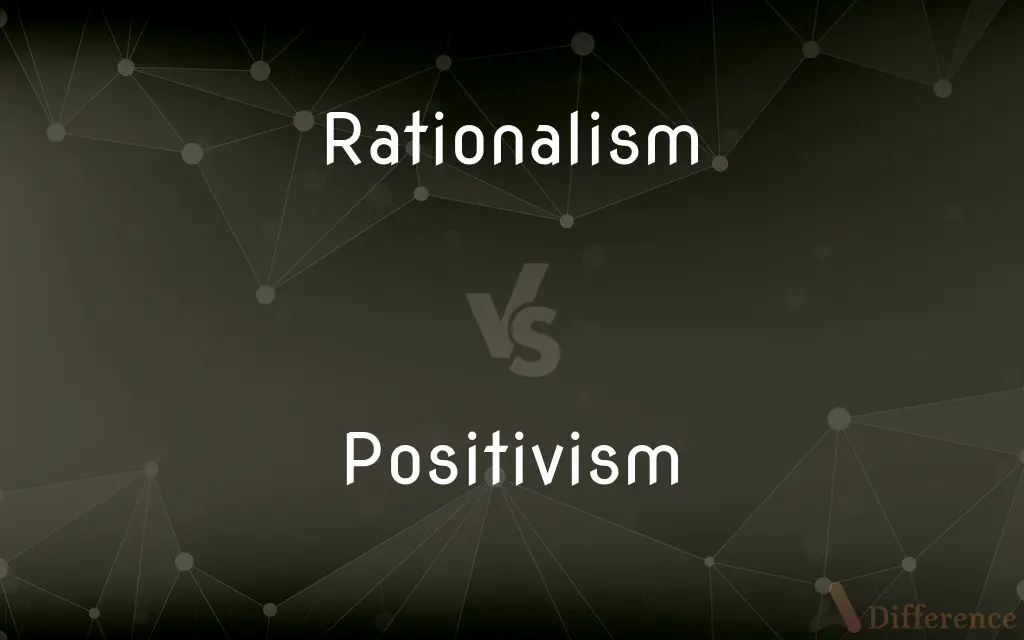Rationalism vs. Positivism — What's the Difference?
By Tayyaba Rehman & Maham Liaqat — Updated on March 6, 2024
Rationalism emphasizes the role of reason in understanding the world, while positivism relies on empirical evidence and the scientific method.

Difference Between Rationalism and Positivism
Table of Contents
ADVERTISEMENT
Key Differences
Rationalism asserts the primacy of reason in acquiring knowledge, suggesting that the structure of reality itself is intelligible to human reasoning. It posits that certain truths are innate or can be known a priori, independent of sensory experience. Positivism, on the other hand, argues that knowledge should only be derived from observable, empirical facts and their logical and mathematical treatment. It emphasizes the importance of the scientific method: observation, experiment, and comparison. Auguste Comte, the founder of positivism, believed that all valid knowledge is scientific and that only information gained through scientific processes should be considered true.
Rationalists argue that through logical deduction, one can discover fundamental truths about the world. Philosophers like René Descartes and Immanuel Kant are key figures in rationalism, advocating that reason is the chief source and test of knowledge. Positivism thus rejects intuition, introspection, and metaphysics as valid sources of knowledge.
While rationalism leans heavily on deductive reasoning, positivism prioritizes inductive reasoning based on empirical evidence. Rationalism often deals with abstract concepts and principles that are considered universally true, regardless of the physical world's conditions. In contrast, positivism is grounded in the reality that can be observed and measured, insisting on the verifiability of hypotheses.
Both rationalism and positivism have significantly influenced the development of modern science, albeit in different ways. Rationalism's contribution lies in its encouragement of systematic doubt and analytical thinking, which are foundational in theoretical research. Positivism has profoundly impacted the development of experimental methodologies and the emphasis on statistical evidence in social sciences.
Despite their differences, both philosophies acknowledge the importance of human intellect in the pursuit of knowledge, each complementing the other by addressing the complexities of understanding the natural and social worlds. Rationalism and positivism together reflect the broad spectrum of approaches in the epistemological quest for knowledge.
ADVERTISEMENT
Comparison Chart
Basis of knowledge
Reason and innate ideas
Empirical evidence and observation
Methodology
Deductive reasoning
Inductive reasoning from specific observations to broad generalizations
Key proponents
René Descartes, Immanuel Kant
Auguste Comte, John Stuart Mill
View on metaphysics
Accepts use of metaphysical concepts
Rejects metaphysics as a source of knowledge
Relation to science
Emphasizes theoretical foundations and principles
Focuses on empirical research and verification
Compare with Definitions
Rationalism
Supports the idea that some concepts are universally true.
Rationalists believe in absolute truths such as the laws of logic.
Positivism
Focuses on the observable and measurable aspects of the world.
Positivism underpins the development of experimental psychology.
Rationalism
The belief in reason as the primary source of knowledge.
Descartes' cogito ergo sum (I think, therefore I am) epitomizes rationalism.
Positivism
Emphasizes observation, experiment, and mathematical/logical deduction for knowledge acquisition.
Positivist studies rely heavily on statistical evidence to draw conclusions.
Rationalism
Encourages critical thinking and skepticism.
Rationalism prompts questioning of assumptions through rigorous logical analysis.
Positivism
Advocates for the use of scientific methods in understanding society.
Sociological studies often employ positivist methodologies to analyze social behaviors and structures.
Rationalism
Relies on deductive reasoning from general principles.
Rationalists argue that the existence of God can be deduced logically.
Positivism
A philosophy that asserts knowledge should be based on natural phenomena and their properties and relations as verified by the empirical sciences.
Positivism drives the scientific method in modern research.
Rationalism
Emphasizes innate ideas, suggesting knowledge exists independently of experience.
Mathematical truths are often cited as examples of rationalist knowledge.
Positivism
Rejects metaphysics and theism as valid knowledge sources.
Positivists argue against using religious beliefs to explain natural phenomena.
Rationalism
Reliance on reason as the best guide for belief and action.
Positivism
Positivism is a philosophical theory that holds that all genuine knowledge is either positive—a posteriori and exclusively derived from experience of natural phenomena and their properties and relations—or true by definition, that is, analytic and tautological. Thus, information derived from sensory experience, as interpreted through reason and logic, forms the exclusive source of all certain knowledge.Verified data (positive facts) received from the senses are known as empirical evidence; thus positivism is based on empiricism.Sociological positivism holds that society, like the physical world, operates according to general laws.
Rationalism
(philosophy) The theory that the reason is a source of knowledge independent of and superior to sense perception.
Positivism
A doctrine contending that sense perceptions are the only admissible basis of human knowledge and precise thought.
Rationalism
Elaboration of theories by use of reason alone without appeal to experience, such as in mathematical systems.
Positivism
The application of this doctrine in logic, epistemology, and ethics.
Rationalism
The theological doctrine that human reason rather than divine revelation establishes religious truth
Positivism
The system of Auguste Comte designed to supersede theology and metaphysics and depending on a hierarchy of the sciences, beginning with mathematics and culminating in sociology.
Rationalism
The doctrine that reason is the right basis for regulating conduct
Positivism
A system of philosophy originated by M. Auguste Comte, which deals only with positives. It excludes from philosophy everything but the natural phenomena or properties of knowable things, together with their invariable relations of coexistence and succession, as occurring in time and space. Such relations are denominated laws, which are to be discovered by observation, experiment, and comparison. This philosophy holds all inquiry into causes, both efficient and final, to be useless and unprofitable.
Positivism
A quality or state characterized by certainty or acceptance or affirmation
Common Curiosities
Can rationalism and positivism be reconciled?
While differing in approaches, both can be integrated in a complementary manner, using reason to interpret empirical data.
How do rationalists view mathematics?
Rationalists consider mathematical truths as innate or a priori, knowable through reason alone.
What role does observation play in positivism?
Observation is fundamental in positivism, serving as the basis for generating and testing hypotheses.
What is the significance of deductive reasoning in rationalism?
Deductive reasoning allows rationalists to derive specific truths from general principles or innate ideas.
Can positivism apply to social sciences?
Yes, positivism applies scientific methods to study and understand social phenomena.
Why is inductive reasoning important for positivists?
Inductive reasoning helps positivists develop general laws from specific observations.
What is the main difference between rationalism and positivism?
Rationalism bases knowledge on reason and innate ideas, whereas positivism relies on empirical evidence and the scientific method.
How does positivism view metaphysics?
Positivism rejects metaphysics, considering it an invalid source of knowledge.
What is an example of a rationalist principle?
"I think, therefore I am" is a classic example of rationalist thought, emphasizing the role of cognition in establishing existence.
How do positivists define truth?
Positivists define truth as what can be verified through empirical research and logical deduction.
Do rationalists reject empirical evidence?
Rationalists do not reject empirical evidence but prioritize reason as the more fundamental source of knowledge.
What distinguishes positivism in the context of history?
Positivism marks a shift towards valuing empirical science as the sole path to knowledge, influencing the development of modern scientific disciplines.
How does rationalism contribute to philosophy?
Rationalism contributes by emphasizing the power and autonomy of reason in understanding and interpreting the world.
Why is positivism critical of intuition and introspection?
Positivism views these methods as subjective and unreliable compared to empirical observation and analysis.
Is rationalism compatible with religious beliefs?
While rationalism emphasizes reason, it does not inherently conflict with religious beliefs, as long as those beliefs can be logically justified.
Share Your Discovery

Previous Comparison
Kevin vs. Kelvin
Next Comparison
Discharge vs. ExhaustAuthor Spotlight
Written by
Tayyaba RehmanTayyaba Rehman is a distinguished writer, currently serving as a primary contributor to askdifference.com. As a researcher in semantics and etymology, Tayyaba's passion for the complexity of languages and their distinctions has found a perfect home on the platform. Tayyaba delves into the intricacies of language, distinguishing between commonly confused words and phrases, thereby providing clarity for readers worldwide.
Co-written by
Maham Liaqat














































